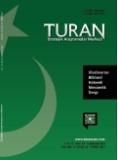TERCEME-İ SİTTĪN Lİ-CĀMİU’L-BESĀTĪN ÖRNEĞİNDE TÜRKÇE KELİMELER ve YABANCI KAYNAKLI KARŞILIKLARI
TURKISH WORDS AND THEIR FOREIGN ORIGINATED RESPONSES IN THE EXAMPLE OF TERCEME-İ SİTTĪN Lİ-CĀMİU’L-BESĀTĪN
Author(s): Arzu Çiftoğlu ÇabukSubject(s): Morphology, Semantics, Sociolinguistics, Turkic languages
Published by: Sage Yayınları
Keywords: Terceme-i Sittīn li-Cāmiu’l-Besātīn; Altıparmak; synonymy; close meaning; foreign counterpart;
Summary/Abstract: Languages take words from each other for reasons such as religion, science, commerce, literature, sports, economics and political relations, etc. Some of the words quoted undergo some changes in terms of sound, form, meaning, and settle in the language. Generally, the language equivalents of these quotations are called "synonyms" because they make the word more understandable. On the other hand, researchers arguing that two or more words can't be used interchangeably in the same context, preferred the terms "close meaning" or "foreign originated response". In this study, The Turkish and foreign equivalents in the work called Terceme-i Sittīn li-Cāmiu'l-Besātīn, which was translated into Turkish by Altıparmak Mehmed Efendi in the XVII. Century will be discussed. In the prophetic work that depicts the life of the prophet Yusuf, an artistic expression specific to verse works is used, and Turkish words are often used together with their Arabic and Persian counterparts. The study consists of three parts. In the first chapter, the concepts of "synonymy", "near-synonymy" and "foreign-sourced counterpart" will be dwelled on, and why the term "foreign originated" is chosen for quoted words used in the same context with Turkish words will be explained. In the second part, the Turkish words in the studied work and their Arabic and Persian equivalents will be listed in items. In the last part of the study, examples of sentences and paragraphs containing Turkish, Arabic, and Persian words used in the same context will be given.
Journal: TURAN-SAM
- Issue Year: 13/2021
- Issue No: 50
- Page Range: 162-174
- Page Count: 13
- Language: Turkish

